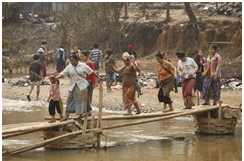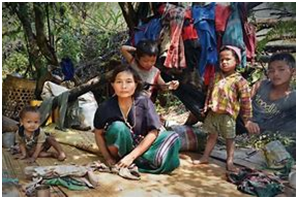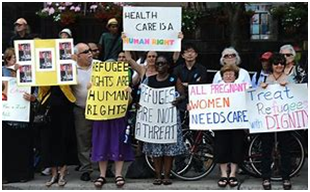Healthcare Assignment on Karen Community Refugee-Gender Challenges in Australia
Question
Task: Prepare a well-research healthcare assignment discussing the refugee-gender challenges encounter by Karen Community in Australia.
Answer
Introduction:
The present healthcare assignment sheds light on the Karen community which is known to be one of the ethnic groups of Burma/Myanmar that have been victimized and persecuted for harassment, killings, and many other criminal offenses. The people belonging to these communities have been resettling to Australia since 2005 afterspending years in the Thai refugee settings. The majority of the people belonging to the Karen community were residents of rural areas who used farming as theirsource of living such as the farming of paddy, and gardening. As they resettled in Australia as refugees,they mainly kept their interest in resettling in rural areas and working in a similar field for their living. Older refugees of the Karen community have been sustaining difficulty in learning an entirely new language after resettlement, but they were provided with works in farms whichhas helped them get an opportunity to live with dignity and have a source of income (Riggs et al., 2017).
Karen communities consist of several subgroupsdifferentiated by their ethnicity, but Australia majorly consists of two subgroups of the Karen community. These two subgroups includeS’gaw Karen and Pwo Karen which are differentiated from each other based on theirdifference in culturalpractice and language. These Karen communities of Burma/Myanmar spent a long stretch of the lives in refugeecamps before they resettled in the rural localities of Australia. Despite resettlement in Australia, the people of Karencommunities have been witnessinggender challenges within their localities and communities which have been developingmajor difficulties for them to sustain better access to health careservices. Thus, the assignment will focus on analyzing and assessing the socioeconomic determinates of health which has been getting influenced by the gender challenges in the case of the Karen community. The facilities and services provided to them to overcome the issue is also been discussed.
Gender challenge and its interaction with the upstream, midstream, and downstream determinant of Turrell’s Framework:
Gender-based challenges have been one of the major issues among the refugee and migrants who seek resettlement to new countries due to witnessing flee from native countries. The Karen community is one of those ethnic refugee communities of Australia who have been witnessing similar cases of genderchallenges among their people which has been contributing to generalcomplications in their life. The gender challenge they waitresses in their daily lives have a greater relation to the socioeconomic determinants of health which gets influenced by several factors (Clark, 2018).
According to the World Health Organization, the health condition is unequivocal in terms of the communities of Australia as it has been found that people of the community with belongs to the low socioeconomic hierarchy sustain deprived health condition and access to health care services (Hynie, 2018). The condition has been clearly identified in terms of the Karen community refugees resettled in Australian premises. It has also been found that people or communities who have a low socioeconomic determinant of health have a higher rate of mortality and provenance of chronic health conditions which accounts for both psychosocial and physiological conditions. Belonging to the refugee communities of Australia, the Karen community has been counted as one of the communities with a low or poor socioeconomic determinant of health. It is explained by the higher rate of deaths and morbidities to chronic illness that they have deprived or poor access to health care services (Ratcliff, 2017). The socioeconomic differences are majorly evident in the case of the female population than a male of the Karen communities due to the challenges they witness at different stages of socioeconomic determinants of health. In order to evaluate the impact of gender challenges among the social determinants of health, the Turrell’s framework of socioeconomic determinant of health is beings used which comprised of three chief determinants which include; upstream, midstream, and downstream determinants(Turrell Framework, 2020).
The upstream determinant of health
Upstream or the macrolevel determinant which accounts for governmental and international policies and influences as well as physical, social, economic as well as environmental factors. Women belonging to the Karen community are bounded under cultural and ethical boundaries which defines respecting each other when belonging to a family (Lakerveld & Mackenbach, 2017). Women of Karen community refugee even are resettlement maintained and followed their traditions and thus are found seeking permission and allowance from the elder male or the husbands to proceed with any task which explains the act of respect but mot control or dominating relationship. Thus, the tradition of seeking permission from the male of the family has developed a major challenge for these women as they are not always permitted to do work according to their will. Children are also found to be grown under such boundaries where they remain submissive to their families and the upbringing is entirely conducted following their traditional values even after resettling to Australia. Also, the socioeconomiccondition gets influenced by the gender challenges as women are not fairly permitted to work or ern for the family which makes males of the familyresponsible for earning. As having large family numbers, deprived social condition, and farming and labor work as the only source of income, they sustain a major issue of poverty and low economic strength when compared to any other western community (LaMancuso, Goldman & Nothnagle, 2016).

Fig 1: Karen refugee camp
(Source:Terry Fredrickson, 2020)
Midstream determinant of health
The intermediate or the midstream determinant of health consists of health behaviors, psychosocial factors along with the health care systems and their roles within the communities of diverse culture and localities. It has been found that the women belonging to the Karen community witnesses cultural differences in the case of health care and nutritional perspectives (Nutbeam & Lloyd, 2020). According to the cultural values and ethics of the Karen community, women are not provided with permission to access health care facilities even during pregnancies or child broth. It is accounted as shameful as if any woman of the community seeks health care access because the health care provider might be a male staff. This is one of the chief reasons why the women of the Karen community are vulnerable to early deaths, death during childbirth, lack of proper nutrition, and other complicated illness. It was also found that Karen women are bound to seek assistance and help from the political leader or trusted religious superiors from their community or families and friends before they get permission to take proper access to health care services. It has been found that they are majorly treated by the religious leaders from their communities for traditional healing in case of any health complication. This condition often develops a major physiological issue due to not attaining significant or appropriate health care services (O'Driscoll et al., 2020).

Fig 2: Karen refugee woman
(Source: Burmalink.org, 2020)
The downstream determinant of health:
In the case of the micro-level or downstream determinant of health, the accountable factors include the biological functioning as well as a physiological system of the people of the community which oftenserves as an outcome of the upstream or midstream determinant of health. Women of the Karen community are generally found vulnerable to exploitation and violence even after sustaining resettlement (Yates?Doerr, 2020). During leaving the country, getting shelter into a new country as a refugee, women belonging to the Karen community experience severe incidents of trauma. It has been found that around two-thirds of the entire women population of the Karen community has survived the process of resettlement without proper food, shelter, water and has witnessed murders and death. Rape and sexual abuse have also been one of the chief reasons behind the development of trauma in the case of Karen women which accounts for around one-third of the entire population. the suffering sustained by the women of the Karen community has made them vulnerable to several health complications such as AIDS, diabetes, malnutrition, depression, anxiety, and other severe mental health complications (Murray et al., 2019).
Addressing gender challenges in the Karen community refuges:
Australia’s Humanitarian Entry Programme has been proposedto provide the women of the refugee communities of Australia with "woman at risk visas". The program has ensured humanitarian visas to 1009 of the vulnerable women who are at risk of abuse, harassment, violence and have no support to sustain resettlement in a new country (Chen, Ling & Renzaho, 2017).
Apart from providing humanitarian visas to these suffering women of the Karen community die to gender challenges, the health department of Australia also ensured fair access to equal opportunities like the other women of the country. One of the major initiatives was taken in the supervision of the Australian, Women’s Health Network. The National Aboriginal and Torres Strait Islander Women’s Health Strategy is also one of the most effectiveinitiatives taken in to account by the government of Australia in favor of the women belonging to the deprived communities of Australia. According to the Australian, Women’sHealth Network, social determinants ofhealth is associated with the socio-economic condition, gender, race, and culture with is also the chief reason behind the inequality women from differentethniccommunities’ witnesses regarding their health (Judd et al., 2020).
The National Aboriginal and Torres Strait Islander Women’s Health Strategy is provided with funding and support from the Gender and Reproductive Health Branch of the AustralianDepartment of Health and Ageing. The strategy has been providing the women of Kareen and other ethnic communities of Australia with education and employment. The has been providingleadership skills and developments among these women to help them leadtheir own lives independently has made their own health and life choices (Seib, 2016). The strategy helps these women have theirequal rights and opportunities which they are provided by the government being the citizen of the country. Nutritional support maternity assistance along with free health care facilities are also provided to the women of these communities to that the trauma and illness they have witnessed during resettlement are overseas and the cases to better health opportunities are initiated.

Fig 3: Protest Against Inequality
(Source: Nicholas Keung, 2020)
Another chief initiative was taken into account by the health department of Australia regarding the rising issue of gender inequality and deprived health conditions of the women belonging to the refugee or other ethnic communities who resettles in Australia. The National Women's Health Policy was developed to serves as a major support for the women of the diverse ethnic groups of Australia. It ensures the fact that deprived healthcondition and being homeless in women cannot be taken casually and it needs to be addressed on urgent grounds. The policy also serves to erase the rising issue of gender inequalities within the women and ensure that they are provided with equal rights as similar to the male of their respective communities (Seymour, 2018). The policy has been also working with the collaboration of health and social acre facilities on local premises to deliver fair health acre opportunities andservices to these suffering women. The nutritional issues, employment, discrimination, and health complication were addressed under the work of the National Women's Health Policy, which not only works for the ethnic community but every woman within the premises of Australia.
Recommendation:
The policesentirely serves to ensure better healthcondition for the womenbelonging to Karen and other ethnic communities of Australiawho has sustained higher risk even after resettlement. The polices need to increase their work premises and ensure independence for the women so that they becomeaccountable for theirownhealth and livingdecisions. Education must be considered as a necessity for thesewomen for which the polices need to sustain changes. Education must be made a mandatory service for these suffering women which the servicesproviders can achieve by conducting community visits and delivering education to these womenpopulations. Education and knowledge will help them understand and recognize the better options they can take in their livesrelated to their health and other social factors (
Svensson, Carlzén & Agardh, 2017). It will also be necessary that
equalemploymentopportunitiesaredelivered to the women of thesecommunities under the act of the policies. Employment must be provided to the women shown are in more need to ensure that they become strong and independent enough to manage and supporttheirfamily’s economic condition (Senthanar et al., 2020). pregnancy and childbirth have been one of the complicatedsituationswhich the women of the community sustain as they do not have proper access tohealth care facilities due to diverse reason. Thus, it will be necessary for the polices to at leastensure maternity health care services to the premises of the communities so that every woman is provided with the basic need that they require during pregnancy and childbirth.
Conclusion:
Thus, to conclude, it can be stated that the Karen community women s have been witnessing severe gender challenges since they flee from their native countries and are still witnessing the same even after resettlement. Karen community refugees have been suffering from poor health condition due to their social determinants of health which accounts for the upstream, midstream, and downstream determinants. These determinants explain their social, ecumenical, physical, mental as well as cultural diversities and differences because of which they have been witnessing a major threat to their heaths. Women become the most susceptible population of these communities as they are treated unequally within their communities and suffer sexual assaults and harassment while they flee from their native countries. Thus, it becomes necessary that the health department of Australia drags its chief focus on the women of these ethnic communities. There are certain policies such as The National Women's Health Policy, National Aboriginal and Torres Strait Islander Women’s Health Strategy and Australia’s Humanitarian Entry Programme have been working within the communities to ensure save and better opportunities for the women of diverse ethnic communities and enhances their health conditions. ?
Reference:
Burmalink.org. (2020). Retrieved 16 December 2020, from https://www.burmalink.org/wp-content/uploads/2018/05/Karen-IDPs.jpg
Chen, W., Ling, L., & Renzaho, A. M. (2017). Building a new life in Australia: an analysis of the first wave of the longitudinal study of humanitarian migrants in Australia to assess the association between social integration and self-rated health. BMJ Open, 7(3), e014313.
Clark, N. (2018). Exploring community capacity: Karen refugee women’s mental health. International journal of human rights in healthcare.
Hynie, M. (2018). The social determinants of refugee mental health in the post-migration context: A critical review. The Canadian Journal of Psychiatry, 63(5), 297-303.
Judd, J. A., Griffiths, K., Bainbridge, R., Ireland, S., & Fredericks, B. (2020). Equity, gender and health: A cross road for health promotion. Health Promotion Journal of Australia, 31(3), 336-339.
Lakerveld, J., & Mackenbach, J. (2017). The upstream determinants of adult obesity. Obesity facts, 10(3), 216-222.
LaMancuso, K., Goldman, R. E., & Nothnagle, M. (2016). “Can I ask that?”: perspectives on perinatal care after resettlement among Karen refugee women, medical providers, and community-based doulas. Journal of immigrant and minority health, 18(2), 428-435.
Murray, L., Warr, D., Chen, J., Block, K., Murdolo, A., Quiazon, R., ... & Vaughan, C. (2019). Between ‘here’and ‘there’: family violence against immigrant and refugee women in urban and rural Southern Australia. Gender, Place & Culture, 26(1), 91-110.
Nicholas Keung. (2020). Retrieved 16 December 2020, from https://th.bing.com/th/id/OIP.tgUNzDttqsF5ysfk0baFiQHaEi?pid=Api&rs=1 Nutbeam, D., & Lloyd, J. E. (2020). Understanding and Responding to Health Literacy as a Social Determinant of Health. Annual Review of Public Health, 42.
O'Driscoll, T., Spaaij, R., Borkoles, E., & Polman, R. (2020). Meaningfully Engaging Karen Refugee Families in Physical Activity: The Outcomes of A Culturally Specific, Co-Designed Program.
Ratcliff, K. S. (2017). The social determinants of health: Looking upstream. John Wiley & Sons.
Riggs, E., Muyeen, S., Brown, S., Dawson, W., Petschel, P., Tardiff, W., ... & Yelland, J. (2017). Cultural safety and belonging for refugee background women attending group pregnancy care: an Australian qualitative study. Birth, 44(2), 145-152.
Seib, C. (2016). Reducing the potential negative impact of chronic life stress on women's health and wellbeing. Australian Nursing and Midwifery Journal, 24(1), 41.
Senthanar, S., MacEachen, E., Premji, S., & Bigelow, P. (2020). Employment integration experiences of Syrian refugee women arriving through Canada’s varied refugee protection programmes. Journal of Ethnic and Migration Studies, 1-21.
Seymour, K. (2018). “Respect for each gender”: Gender, equity and backlash in Australia's male health policy. Australian Journal of Social Issues, 53(2), 123-138.
Svensson, P., Carlzén, K., & Agardh, A. (2017). Exposure to culturally sensitive sexual health information and impact on health literacy: a qualitative study among newly arrived refugee women in Sweden. Culture, health & sexuality, 19(7), 752-766.
TERRY FREDRICKSON. (2020). Retrieved 16 December 2020, from https://www.bangkokpost.com/media/content/20130325/485115.jpg
Yates?Doerr, E. (2020). Reworking the Social Determinants of Health: Responding to Material?Semiotic Indeterminacy in Public Health Interventions. Medical Anthropology Quarterly, 34(3), 378-397.
Turrell Framework. (2020). Retrieved 16 December 2020, from https://eprints.qut.edu.au/585/1/turrell_health_inequalities.pdf












